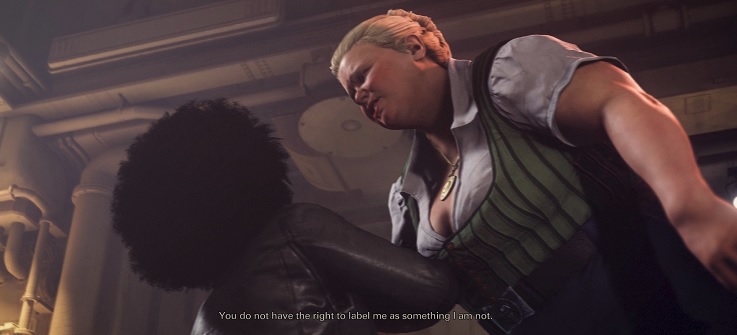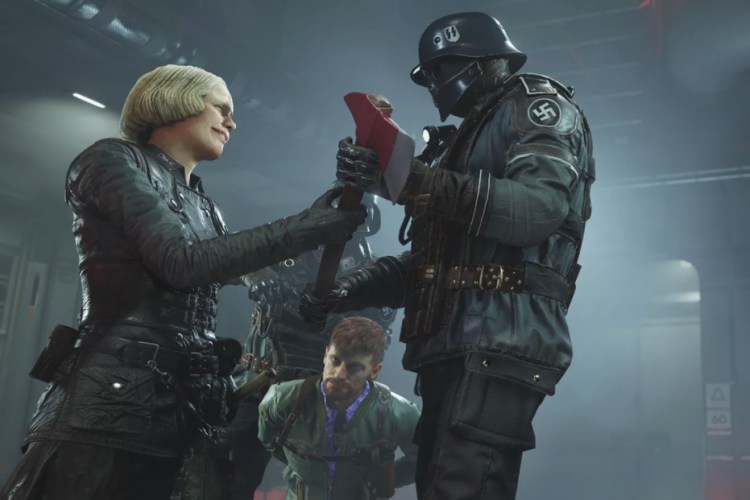GamesBeat: Is there anything else you look back on like that?
Matthies: I think the whole game is just a series of tricky things to execute right. Starting with the wheelchair sequence, or even before that, the prologue with all these flashbacks back and forth and different points in time, different locations, B.J.’s childhood. Hiding in the closet with the dog as the parents are arguing. All of these have to come together in a particular way to work — not just in terms of the writing and performance, but everything. The audio design. How are the blinds in the wardrobe door located, so you have visibility, but you’re still hiding in there? There are tons of things to work through and iterate on until it feels like a cohesive piece.
https://www.youtube.com/watch?v=inHvZ25b5VY
GamesBeat: I felt like I had too much freedom to get lost and wander in the submarine.
Matthies: It is pretty big. In some ways it’s challenging because it needs to fill a lot of purposes, the submarine. Did you use the hint markers? You can call up secondary hints by pressing down on the D-pad. That’s also a problem in terms of tutorializing, because you want to keep the energy up when things are happening, but you’re tutorializing at the same time. It may be that players get distracted by something else as the tutorial is being presented.
GamesBeat: As far as the Hitler scene, that got a lot of attention. Did you anticipate that? Was anything surprising about the reaction?
Matthies: It’s hard for me to quantify, because I don’t really track that stuff. You read 100 comments, and even if 95 are positive, the other five really depress you. I don’t look at reactions too much. But I was incredibly happy with how the scene came out. That was challenging to put together in all its faces. It came out better than I envisioned, and when that happens it’s always amazing. To a very large degree it’s thanks to the amazing performers. They really got in there and found ways to make the material better than I thought was possible.
GamesBeat: Why did you want to go into space again?
Matthies: We even teased it in the first game. We always wanted to make a level on Venus, but–
GamesBeat: Because of the gameplay variation?
Matthies: Yeah, yeah. It’s everything, really. I love that sense of adventure. That’s part of what we want to do, to have some of that Indiana Jones, going to cool places. What’s cooler than going to a different planet? Venus was interesting because it hasn’t been done so much. Destiny has, but I don’t think anybody else has. It’s pretty rare, anyway. Usually it’s Mars. Dealing with Venus and the different look and the atmospheric problem and all that stuff, we thought that would be really cool.
In the first game, when you go to London Nautica, you see posters that say “Next Stop Venus!” Of course it’s in German, but—all of that stuff is seeded in the first game. We really wanted to pay that off in this one.
GamesBeat: I had a little trouble with those crypto puzzles at the very end.
Matthies: Oh, yeah, the Enigma stuff. I wasn’t too heavily involved in that thing, because it’s very pure gameplay mechanics, but there was a lot of iteration around figuring that out.
GamesBeat: Did you find a lot of people went off and did those?
Matthies: For sure, tons of people. From the data, it’s very common. As a developer it’s always hard to know if things are a little too complicated for people to understand, because you evolve with the problem as someone tells you how to work it.
GamesBeat: Going off and finding extra things to do after the story over, though, that was fun.
Matthies: Yeah, yeah, having some sort of endgame there so people could get more out of the game.
GamesBeat: Do you have any reactions to the ending? We can talk about spoilers now that everyone’s finished it, I suppose.
Matthies: I think it has the right vibe of creating a sense of revolution and capping it off with a proposal. I feel good about it. It’s also very different depending on the timeline. It’s two different speeches. I don’t know which timeline you played.
GamesBeat: There’s a finality to the ending for the villain. Splitting her head in two, you can’t bring her brain back.
Matthies: Oh, yeah. She’s done for. That ship has sailed.

Above: Wolfenstein II: The New Colossus
GamesBeat: Not coming back in Wolfenstein III?
Matthies: Not in a physical form at least. Who knows? Maybe there’s a flashback. Not confirming Wolfenstein III, by the way! I’m just speculating here. In theory, if that game were to happen, there would be a different villain.
GamesBeat: Jeff Grubb liked the game a lot, too. He kept arguing with me about how it was better than Call of Duty.
Matthies: [laughs] Well, thank him from me. I don’t think there’s really anything alike in the games we’re making. They’re first-person shooters, fundamentally, but in terms of the vibe and the twists and turns of the story beats — basically, I don’t think any other publisher would greenlight these projects.
GamesBeat: One of his points that I agree with, he felt like you held it together in a storytelling way very well. Starting with a subplot and having it go through an arc and finishing it. Not every game accomplishes that.
Matthies: We work a lot on that. We always map out the arcs for each character. Tommy and I, my co-writer, we’ll talk everything through. We’ll sketch something out. If we’re not happy about it we discuss something again and we’ll figure out something else. There’s a lot of thought put into — we want each of our characters to feel like they’re going on some sort of journey along with you. We don’t like it when they’re static the whole way through. But that’s challenging, too, when you have such a big cast. It’s hard to fit everything in. I’m happy with how it came together.
GamesBeat: Did you have any interesting reactions to the daughter character, Sigrun Engel? She could be viewed in a lot of different ways, I think, whether she was sympathetic or laughable or something else.
Matthies: Alyssa Preston, who played the character, did an amazing job in conveying that complexity. Of course this is someone who grew up as the daughter of a big Nazi party leader. Completely absorbed in the Nazi ideology and culture. She’s trying to find her way out of that, but she still has tremendous crimes in her history. Even though she perhaps wasn’t the main engineer of those crimes, she wasn’t very active in trying to stop them either. She’s a complicated character. Alyssa did an amazing job of humanizing her. She’s always interesting, at every moment you have with her. I don’t mind it if you as a player have conflicting emotions about our characters.

Above: Sigrun Engel plays a significant role in Wolfenstein II: The New Colossus.
GamesBeat: In some ways it seems tricky because she’s a sympathetic character, but you don’t want to make her too sympathetic, because that becomes a political statement. “Hey, not all of these Nazis are so bad.”
Matthies: I think it’s also important — of course, this happened back then, and it happens today — to show the people who get out of that world. There’s something hopeful about that. This is an interesting part of the game, how we leave a lot of information about the characters up to the player. You as a player decide your own level of involvement.
There’s a big scene you can discover, if you go to the canteen in the submarine at the right time — there’s an argument between Anya and Sigrun about Sigrun being passive while these atrocities have occurred. But not every player gets exposed to that. There’s a lot of additional depth you can find, depending on how willing you are to spend time exploring. That’s the nature of our games. We want players to have that freedom. Some people like to push through and do a lot of shooting. Some people like to look at every note and explore every room. We like to permit that whole range.
GamesBeat: In this case you lose out more if you don’t pay attention to what seems to be a minor character.
Matthies: I guess I’m that kind of person myself. I like to do a lot of exploring. I love that in games, when I enter a space and see something new there, something happening. It didn’t have to be there. The game would still work. But to find stuff like that is very rewarding as a player.

